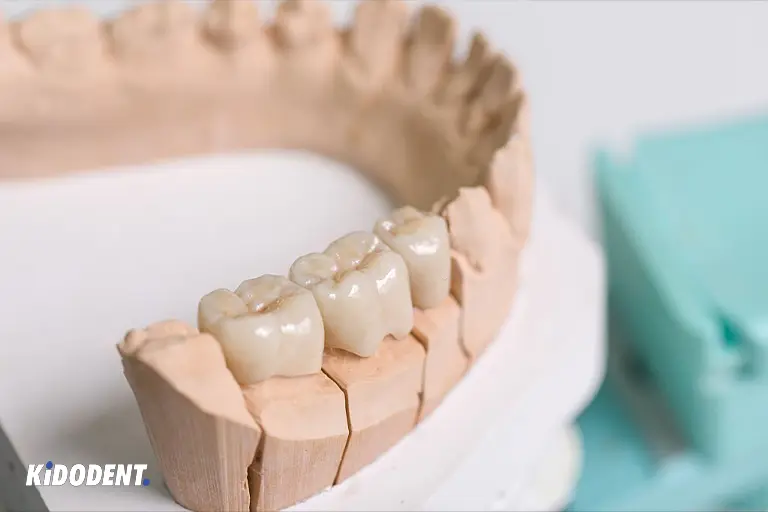Both a root canal and a dental crown are two separate procedures. You can get one without the need for the other. When you are about to get a dental crown, you might ask this question “Can I get a Crown without a root canal?” The simple answer is that getting a crown doesn’t always require a root canal. However, if your tooth’s pulp is infected, you will need to get a root canal before you get a crown. In this article, we will explore the relationship between a crown and a root canal. We will explain in which situations it might be necessary to get a dental crown after your root canal or vice versa.
Is a dental crown necessary after a root canal?
A dental crown is a tooth-shaped cap a dentist places over a tooth that has experienced some significant structural damage. Crowns restore the size, shape, function, and appearance of a damaged, decayed, or seriously discolored tooth.
A root canal, on the other hand, is a procedure to treat and remove the infected or inflamed pulp inside your tooth. Under the hard enamel and the soft dentin layer, there is the pulp that extends to the tip of the roots of each tooth. The pulp contains the nerves, blood vessels, and connective tissue.
Your dentist or an endodontist—a dentist who specializes in root canal—removes the infected or inflamed pulp, cleans and shapes the inside of the root canal, and finally fills and seals it off. To bring your tooth to its full function, now a dentist should place either a crown or other types of restoration on the tooth.
Here are the reasons that an endodontist or dentist may recommend a crown after your root canal treatment:
Strengthen the fragile tooth
The drilling process and removing the tooth structure during root canal procedure may weaken the tooth. In order to protect the fragile tooth and bring long-term stability and function, a dentist will likely place a crown rather than a filling.
Remember that most likely teeth that need root canal therapy are already badly broken down and decayed. So, the best option for restoring the tooth is a crown.
Prevent recurrent infections
The extensive decay, cavities, deep injuries (cracks or chips), and even repeated dental procedures are all reasons that bacteria can penetrate into the dental pulp and cause infection.
To fix this, your dentist will first perform a root canal on the affected tooth to bring back its health and then make a crown to rebuild the tooth. The crown will provide great protection for the broken-down tooth, minimizing the risk of infection from reoccurring.
Protects the tooth from sensitivity
Your tooth will function as it normally does after a root canal. However, if your tooth is severely damaged and there isn’t enough tooth structure, the risk of sensitivity to hot and cold temperatures will increase. A dental crown is recommended to restore the structural integrity of the tooth. It helps protect the remaining dental nerve. And it reduces the chance of sensitivity or pain which could rise because of the lack of enough protection.
Can you get a crown without a root canal?
Yes, you can. Getting a crown doesn’t necessarily require a root canal. But there is no doubt your dental professional will recommend a root canal if the dental pulp is damaged or if there is a risk it will be compromised in some way. Here are some situations that a root canal is not necessary once getting a crown:
- There are minor chips or cracks and there are no deep cavities which may have reached the tooth’s pulp and involved the dental nerve.
- Sometimes crowns serve as cosmetic purposes to cover a discolored and stained tooth.
- In case your crown caps the implant or supports a dental bridge
How do you know if you need a root canal or just a crown?
Crowns provide many benefits when it comes to a restoration choice after a root canal. They reinforce the tooth, providing a great strengthening effect and longevity. Your dentist or endodontist will determine whether to put a crown or not.
Also, if your tooth’s pulp is infected, getting a root canal is the only way to save your tooth. These are the signs that mean you might a root canal before getting a crown:
- Severe pain when chewing or biting
- Teeth sensitivity to hot or cold
- Tender or swollen gums
- A Cracked, chipped, or severely decayed tooth
- Tooth discoloration
While a crown isn’t always necessary, some factors will make it most likely to get one, such as:
- The condition of the tooth. When a tooth is severely injured or infected, you will most likely need a dental crown. Deep cavities, serious fractures, and cracks require a crown rather than a filling only.
- Back teeth or front. Teeth in the back—molars and premolars— are needed for chewing. These teeth should withstand greater amount of pressure compared to front teeth like canines and incisors, which aren’t used for chewing. Therefore, it is more likely for back teeth to need a crown than front ones after your root canal.
- Repeated procedure or restoration on the same tooth. The chance of receiving a crown will increase if your tooth has undergone a procedure or a restoration before. Sometimes, a previous root canal might fail or your old filling may break, so the tooth will be better off with a crown to maintain its function and appearance.
